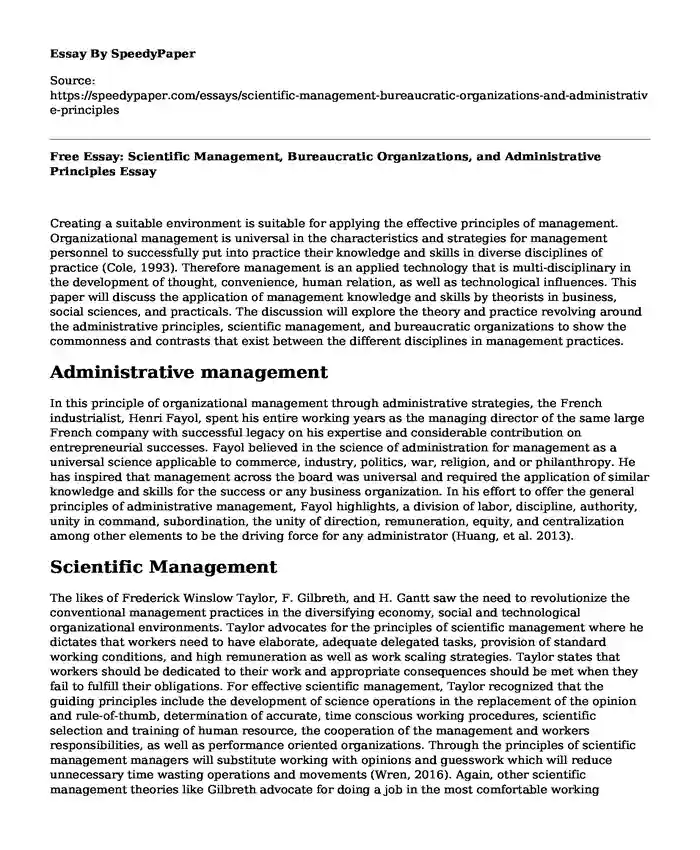
| Type of paper: | Essay |
| Categories: | Management |
| Pages: | 3 |
| Wordcount: | 689 words |
Creating a suitable environment is suitable for applying the effective principles of management. Organizational management is universal in the characteristics and strategies for management personnel to successfully put into practice their knowledge and skills in diverse disciplines of practice (Cole, 1993). Therefore management is an applied technology that is multi-disciplinary in the development of thought, convenience, human relation, as well as technological influences. This paper will discuss the application of management knowledge and skills by theorists in business, social sciences, and practicals. The discussion will explore the theory and practice revolving around the administrative principles, scientific management, and bureaucratic organizations to show the commonness and contrasts that exist between the different disciplines in management practices.
Administrative management
In this principle of organizational management through administrative strategies, the French industrialist, Henri Fayol, spent his entire working years as the managing director of the same large French company with successful legacy on his expertise and considerable contribution on entrepreneurial successes. Fayol believed in the science of administration for management as a universal science applicable to commerce, industry, politics, war, religion, and or philanthropy. He has inspired that management across the board was universal and required the application of similar knowledge and skills for the success or any business organization. In his effort to offer the general principles of administrative management, Fayol highlights, a division of labor, discipline, authority, unity in command, subordination, the unity of direction, remuneration, equity, and centralization among other elements to be the driving force for any administrator (Huang, et al. 2013).
Scientific Management
The likes of Frederick Winslow Taylor, F. Gilbreth, and H. Gantt saw the need to revolutionize the conventional management practices in the diversifying economy, social and technological organizational environments. Taylor advocates for the principles of scientific management where he dictates that workers need to have elaborate, adequate delegated tasks, provision of standard working conditions, and high remuneration as well as work scaling strategies. Taylor states that workers should be dedicated to their work and appropriate consequences should be met when they fail to fulfill their obligations. For effective scientific management, Taylor recognized that the guiding principles include the development of science operations in the replacement of the opinion and rule-of-thumb, determination of accurate, time conscious working procedures, scientific selection and training of human resource, the cooperation of the management and workers responsibilities, as well as performance oriented organizations. Through the principles of scientific management managers will substitute working with opinions and guesswork which will reduce unnecessary time wasting operations and movements (Wren, 2016). Again, other scientific management theories like Gilbreth advocate for doing a job in the most comfortable working environment with few motions while Gantt hypothesizes that management entails the creation of favorable working conditions.
Bureaucracy Organizations
The organizational form of bureaucracy management that entail having dominant characteristics like the hierarchy structure of authority or management system. The primary theorists in bureaucratic organizations are Max Weber who advocated for a formal rule system, formal selection of human resource, hierarchy authority exercise, and distinct division of labor. In the principles of universal management practices, Weber outlines three types of legitimate authority which include the conventional authority, charismatic authority, and the rational authority. These three common types of bureaucratic organizations have common features what include rules governing conduct, specified competencies, protocol chain of command, elaborate offices, hierarchy decision-making structure, and expertise recruitment (Fritz, & Rosser, 2009).
Conclusively, understanding the management of the organization in different disciplines as propounded by principle thinkers gives appropriate direction on the elements and principles that drive management or authoritative responsibility in the working environment. Each theorist dictates on the cause of action and management behavior that draws the organizational structure.
References
Cole, G. A. (1993). Management Theory and Practice. London: DP Publications Ltd.
Fritz, Sager & Rosser, Christian. (2009). Weber, Wilson, and Hegel: Theories of Modern Bureaucracy. Weber, Wilson, and Hegel: Theories of Modern Bureaucracy 69.6: 1136-147. ProQuest Research Library: Business.
Huang, Kai-Ping, et al. (2013). A review and critical analysis of the principles of scientific management. International Journal of Organizational Innovation (Online) 5.4: 78-85. ProQuest.
Wren, Daniel A. (Jan 17, 2016). Management history: issues and ideas for teaching and research. Journal of Management Summer 1987: 339+. General OneFile. Web. Print.
Cite this page
Free Essay: Scientific Management, Bureaucratic Organizations, and Administrative Principles. (2022, Jul 12). Retrieved from https://speedypaper.net/essays/scientific-management-bureaucratic-organizations-and-administrative-principles
Request Removal
If you are the original author of this essay and no longer wish to have it published on the SpeedyPaper website, please click below to request its removal:
- Lateral Torsional Buckling - Free Essay in Engineering
- Environmental Endocrine Disruptions - Essay Sample
- Why Is Twitter the Medium of Choice for Donald Trump? The Free Essay Answers
- Stress - Dancing with Wolves
- Essay Example on the Family Systems Concept
- Free Essay Example on Depressive Disorder
- Free Essay Example - Final Push
Popular categories




